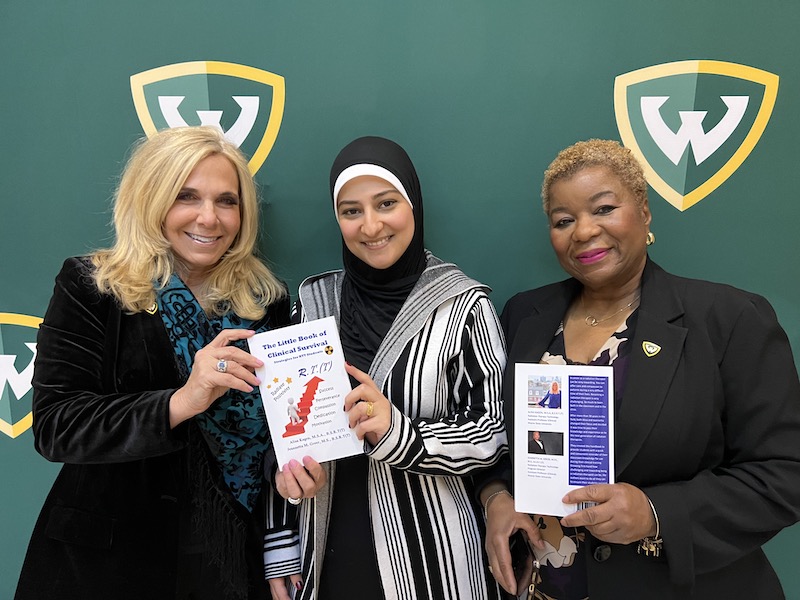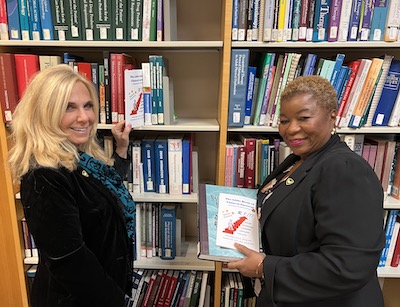Radiation Therapy Technology professors publish clinical survival handbook
 Radiation Therapy Technology students walking into their first clinical rotation can now do so with two experienced faculty members by their side.
Radiation Therapy Technology students walking into their first clinical rotation can now do so with two experienced faculty members by their side.
Late last year, WSU Eugene Applebaum College of Pharmacy and Health Sciences RTT Program Director Jeannetta Greer and Assistant Clinical Professor Alisa Kagen self-published The Little Book of Clinical Survival Strategies for RTT Students. The two-person faculty team and former WSU RTT program classmates wrote the content based on their years of experience, and enlisted current student Khouloud Moussa to design the cover. Because it's being sold on Amazon, the handbook is available not only to WSU Applebaum RTT students but to RTT students across the globe.

Above: Kagen (left) and Greer take their rightful place among the authors in the WSU Applebaum library.
"This book has everything RTT students need to excel in their clinical practicums," Kagen said. "There are tips, tricks, hacks and more. It's our hope that this quick reference guide makes their survival of clinical much easier."
The handbook - which Greer and Kagen say is especially helpful for students beginning an RTT program in their first and second rotations - reminds students about what they've learned in the classroom regarding clinical setups, imaging, treatment side effects, shifting patients and more.
When Kagen promoted the guide on her personal Facebook page, dozens of people commented, including a fellow RTT professional who wrote, "Wish I'd had that back in '88!"
The faculty writing team also shared the sales link in a Facebook group designated for RTT students, where one member commented, "I got the book! Going into my second semester, I was able to read over my winter break [for] great tips! Highly recommend."
Greer said that publishing this book has been a rewarding way to help their lessons linger long beyond the classroom, adding, "We know firsthand how challenging and rewarding being a radiation therapist can be, and we want to do all we can to ensure our students succeed."
Radiation therapists have a unique opportunity to blend the knowledge and skills of mathematics, science and psychology in their daily work. Radiation therapists operate sophisticated radiation equipment to treat malignant tissue, assist in designing cancer treatment through the use of 3D computer-generated calculations, recognize when a patient is having additional medical problems that require a doctor's attention and provide psychological support for patients who are dealing with the stress of their illness. The bachelor of science in Radiation Therapy Technology is offered through Wayne State's Eugene Applebaum College of Pharmacy and Health Sciences with an application deadline of Nov. 30.
An anchor in urban health care
The Eugene Applebaum College of Pharmacy and Health Sciences is built on more than 100 years of tradition and innovation in the heart of Detroit. We have grown deep roots in our city, harnessing its powerhouse hospital systems and community service organizations as vibrant, real-world training grounds for students, with an ongoing focus on social justice in health care. And our research at all levels - from undergraduates to veteran faculty members - translates into creative solutions for healthier communities.
Wayne State University is a premier urban research institution offering approximately 350 academic programs through 13 schools and colleges to more than 25,000 students.